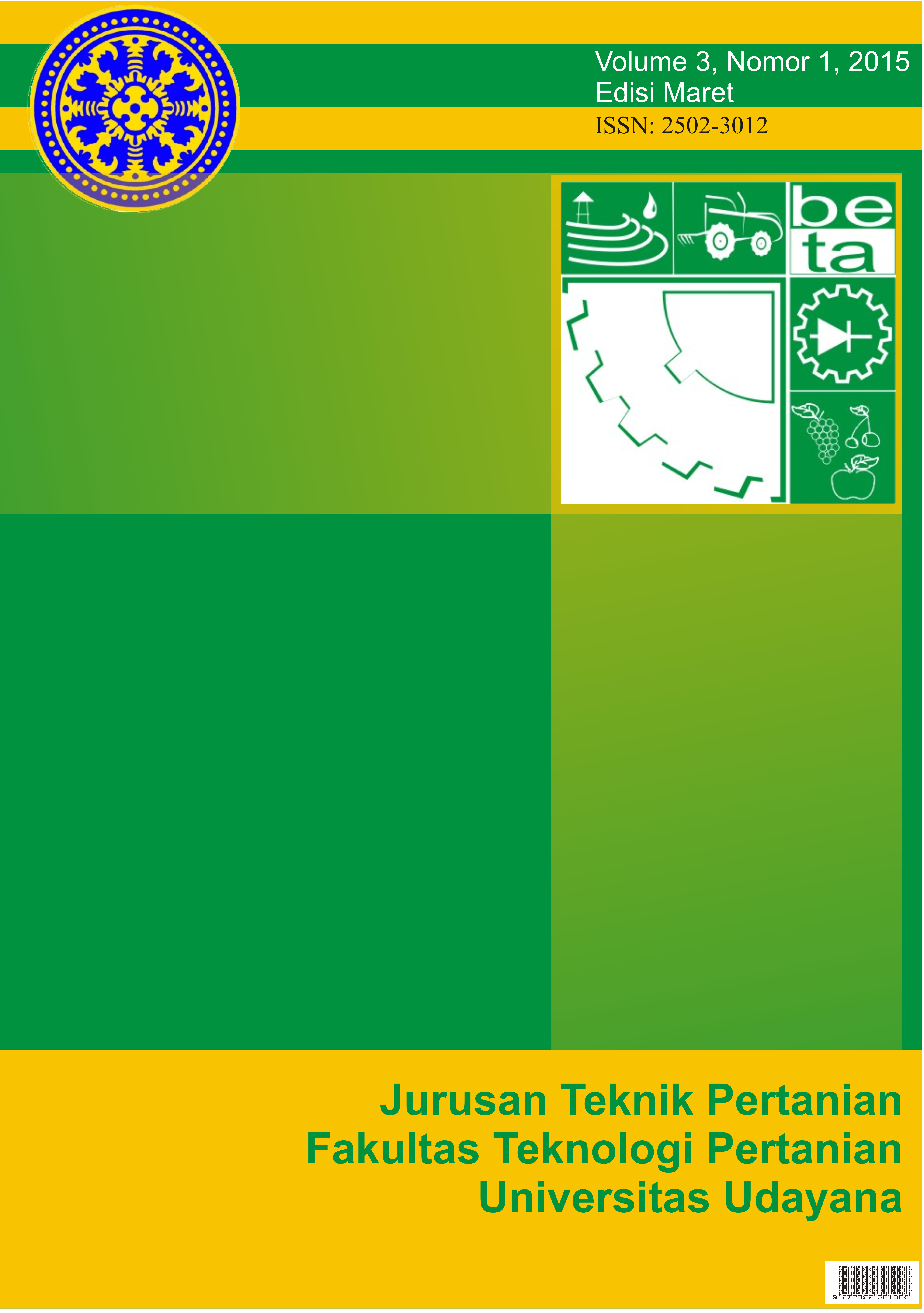Pengaruh Pelapisan Emulsi Minyak Wijen dan Minyak Sereh Terhadap Mutu dan Masa Simpan Buah Tomat (Lycopersicon esculentum Mill)
Abstract
The purpose of this study was to determine the effect of different concentrations of sesame and lemongrass oils emulsion in water as coating materials on quality of tomato fruits during storage at room temperature. The concentration of sesame oil emulsionwas varied 0%, 0.5%, and 1% in combination of lemon grass oil of 0%, 0.5%, 1%, and 1.5%. Additional materials used to make the emulsion were 1% of polysorbate 80, 0.5% oleic acid, and ethanol3%. Control fruits without treatments were also prepared for comparison. The experiment was performed using a Completely Randomized Design (CRD) with three replications. The results showed that treatment of a mixture of sesame oil and lemongrass oil significantly affected the quality and storagelife of the tomato fruits. The combined concentration of 0.5% sesame oil and 0.5% of lemongrass oil gave the best result which was able to reduce the weight loss, spoilage damages, change of pH and total soluble solidof the fruit juice, and texture (hardness)
Downloads
References
Burt, S. 2004. Essential oils: their antibacterial properties and potential applications in foods: a review. Intl. J. Food Microbiol.94: 223−253.
Crisosto, C.H., Garner, D., Doyle, J., and Day, K.R. 1993. Relationship Between Fruit Respiration, Bruising Susceptibility and Temperature in Sweet Cherries. J. Hort. Science, 28 (2) : 132-135.
Ella, M.U. 2013. Uji Efektivitas Konsentrasi Minyak Atsiri Sereh Dapur (Cymbopogon Citratus) Terhadap Pertumbuhan Jamur Aspergillus Sp. Secara In Vitro. Fakultas Pertanian Unuversitas Udayana.
Hartuti, N. 2006.Penanganan Segar pada Penyimpanan Tomat dengan Pelapisan Lilin untuk Memperpanjang Masa Simpan. Balai Penelitian Tanaman Sayuran. Bandung.
Inggas, A.N. 2013.Pengaruh emulsi minyak nabati sebagai bahan pelapis buah tomat (Lycopersicon esculentum Mill.) terhadap mutu dan masa simpannya.Fakultas Teknologi Pertanian Universitas Udayana.
Isnaini, N. 2009.Pengaruh Edible Coating Terhadap Kecepatan Penyusutan Berat Apel Potongan. Program Studi Teknik Kimia, Fakultas Teknik, Universitas Surabaya.
Kremer, Fr. & Unterstenhofer, G. (1967): De l’ emploi de la metode de Townsend et Heuberger dans l’interpretation de results d’essais phytosanitares. Pflanzenschutz Nachrichten, Bayer 4: 625–628.
Maizura, M. A. Fazilah, M.H. Norziah, dan A.A. Karim. 2007. Antibacterial Activity and Mechanical Properties of Partially Hydrolyzed Sago Starch- Alginate Edible Film Containing Lemongrass Oil. J of Food Science 72 (6) : c324-c330.
Makfoeld, D. 1992. Buah Klimakterik. Fakultas Pascasarjana Universitas Gadjah Mada. Yogyakarta.
Muchtadi, T. R. 1992. Fisiologi Pascapanen Sayuran dan Buah-buahan.Departemen Pendidikan dan Kebudayaan. Jendral Pendidikan Tinggi. PAU. IPB. Bogor.
Muchtadi, T. R. 1992. Fisiologi Pascapanen Sayuran dan Buah-buahan. Departemen Pendidikan dan Kebudayaan. Jendral Pendidikan Tinggi. PAU. IPB. Bogor.
Quintavalla, S. and L. Vicini. 2002. Antimicrobial food packaging in meat industry. Meat Sci. 62: 373– 380.
Rudito.2005. Perlakuan Komposisi Gelatin dan Asam Sitrat Dalam Edible Coating yang Mengandung Gliserol Pada Penyimpanan Tomat. Program Studi Teknologi Hasil Perkebunan. Politeknik Pertanian Samarinda.
Sinaga, R.M. 1994. Penelitian Mutu Fisis Buah Beberapa Varitas Tomat. Buletin Penelitian Hortikultura. Balai Penelitian Hortikultura. Lembang. 11 (4) : 32-37.












 Jurnal BETA (Biosistem dan Teknik Pertanian)
Jurnal BETA (Biosistem dan Teknik Pertanian)


